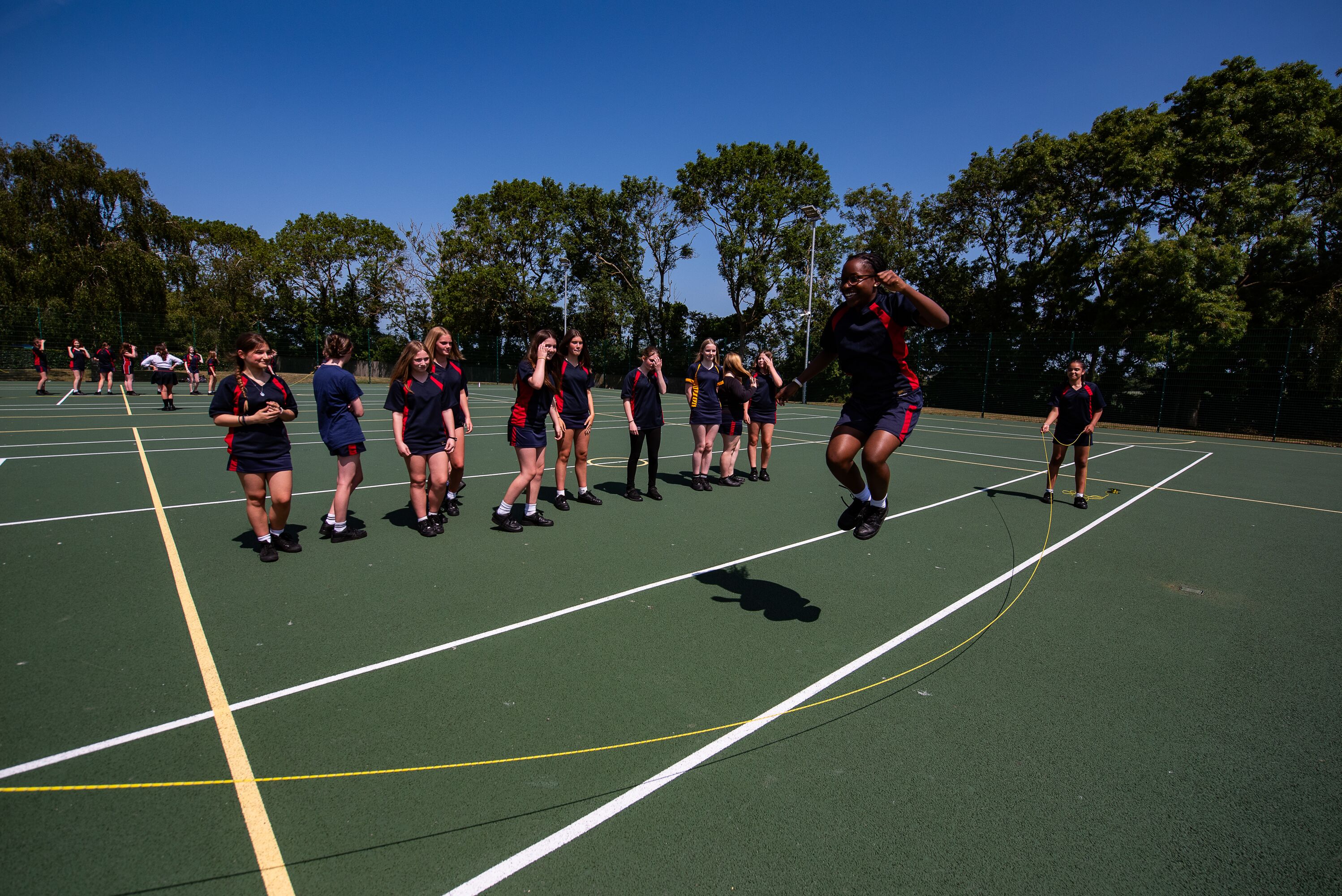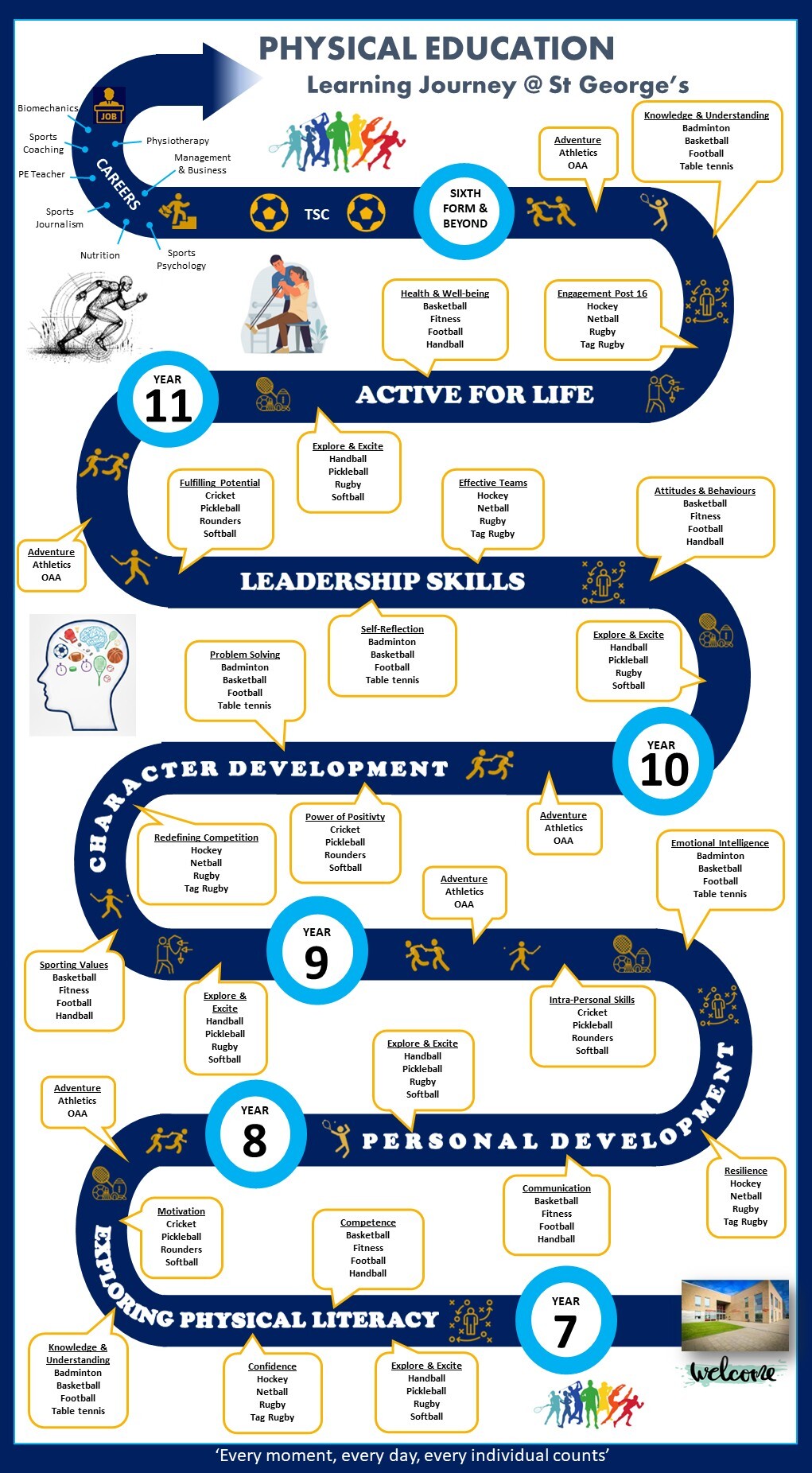PE / Games

PHYSICAL EDUCATION EXPECTATIONS
At St George’s we strongly believe that Physical Education is a very important part of children’s development and wellbeing. Studies have found that children and their academic development can be improved through Physical Education after the pandemic hampered their progress. The physical and mental benefits that regular activity can provide are abundant. Improved mood, cognitive development for children and fitness management can all contribute to academic improvement.
The Department for Education state that “Physical education is part of every child’s entitlement to a good education”. It is a compulsory part of the curriculum for all pupils at every Key Stage, from age four to 16.
Subject Vision
A broad, stimulating and inclusive curriculum, that develops students Physically, Psychologically, Socially, Technically & Tactically in a range of sporting situations (PPST)”
Curiosity – The subject explores a wide variety of team and individual sports, fitness training, and fitness testing. Promoting active participation and lifelong learning as well as social and psychological development.
Adventure – The curriculum supports students’ self-esteem and well-being and provides an environment where they are stretched (Physically, Psychologically, Socially, Technical & Tactically). The curriculum ‘spirals’ over time, with students’ knowledge gradually building on what has been learnt each year.
Resilience - Lessons are fun and challenging, promoting students to work in small groups where they can develop skills and tactics in a wide range of sports. We believe a higher quality of learning occurs by exposing students to increased ball rolling time. Students are placed in situations where they need to develop and rely on their own decision-making skills, this helps cement learning in pressure situations.
Challenge – Students are challenged to achieve their full potential in all areas covered (PPST). They are encouraged to push themselves out of their comfort zone and to be comfortable in attempting new skills, even if that involves failing and struggling. Students are encouraged to become comfortable at being un-comfortable.
Independence – Lessons are fun and engaging and teachers use various strategies to students are challenged and build independence and resilience.
Community – Students have access to extra curricular activities and compete against other local schools in various competitions. We also engage with local clubs to ensure our links with the local sporting community is strong.
Games Assessment
ASSESSMENT
During assessment, pupils will receive a maximum score of 18. This is achieved by teaching staff assessing the pupils using the diagram below.

At key stage 3 (years 7-9) pupils will receive an assessed colour. This assessed colour is based on ranked position within the year group using the score achieved. For more information on this please go to the Academic Overview guide.
At key stage 4 (years 10 and 11) pupils will receive an assessed grade. This will either be Emerging (E), Developing (D), or Mastery (M). Again, this is based on the diagram above.
PE Learning Journey

PROCEDURE IF YOUR CHILD IS UNABLE TO PARTICIPATE IN THEIR PE LESSON
- If your child is ill or injured they must bring a note in from home.
- If your child is unable to participate due to a long term medical condition a medical certificate must be provided. This should be updated termly and your child will be taken out of the subject to study extra RE or technology, depending on the year group timetable.
- When your child is ill or injured they will be expected to be involved within the lesson, completing worksheets, officiating and carrying out peer assessments.
- If your child has 3 notes within a term, their teacher will contact you to discuss this with you
PROCEDURE IF A CHILD DOES NOT BRING IN KIT FOR THE LESSON
If your child forgets their kit, staff will provide the student with school kit. If they refuse to wear this kit they will be given a St George’s after-school detention.
If they then do not engage in the lesson, behaviour support will be contacted if your child fails to follow these procedures and then they will be removed to the safe room.
PE Lessons each term
|
Term 1 |
Term 2 |
Term 3 |
Term 4 |
Term 5 |
Term 6 |
|
Rugby Softball Handball Pickleball |
Football Basketball Handball Fitness |
Rugby Netball Hockey Badminton |
Football Basketball Table Tennis Badminton |
Cricket Rounders Softball Pickleball |
Athletics OAA |
Careers
Physical education lends itself to a range of careers in sports and fitness as well as other industries that you may not have considered before. For example, did you know that many nutritionists, physical therapists and chiropractors have a degree in PE?
Some careers that you could consider doing with PE include:
- Sports science
- PE teacher
- Physiotherapist
- Professional sportsperson
- Sports coach/consultant
- Sports policy at local and national level
- Diet and fitness instructor
- Personal trainer


